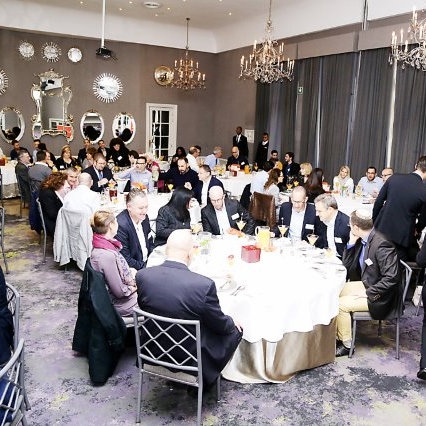
Achievers

Breakfast of analysts and stars
NICOLA MILTZ
As a proud sponsor of the Jewish Achiever Awards for the past 16 years, Absa welcomed this year’s illustrious nominees, past winners and VIPs, to a morning of networking, sumptuous food and stimulating presentations.
“Welcome to our Galaxy of Stars” said Howard Sackstein, chairman of the SA Jewish Report in his welcoming address. He explained this year’s theme was chosen because 55 years ago John F Kennedy said: “We choose to go to the moon in this decade and do the other things, not because they are easy, but because they are hard.”
Sackstein said that this “boldness of spirit” is what “inspired a generation” and that this “relentless optimism and dogged determination” is what we need now “more than ever”.
He said that the Jewish community’s message to the country’s leaders is clear: “Our country deserves better, the people of this nation deserve better and we will not sit idly by as the very fabric of our society is destroyed. All of us in business, in the arts, in civil society. have not only a right but an obligation to ensure the protection and resurrection of our country.”
Craig Bond, Chief Executive: Retail and Business Banking, Barclays Africa, spoke about how important the sponsorship of the Jewish Achiever Awards is to Absa.
“This community thrives on the concept of abundance” and on the concept of giving, whereby “the more you give the more you get”, he said. He spoke of the Jewish community’s “culture and feeling of abundance”, which he linked to Absa’s philosophy of shared growth.
He said that like Absa, the Jewish community believe: “When we share, we grow.” This is a business philosophy that reaffirms the bank’s commitment to economic and social growth on the continent, he explained.
Absa senior economist, Jeff Gable, in a somewhat sombre tone, told it like it is with a slide presentation outlining the gloomy state of the economy. He spoke about “the politics of rage” citing the global economic effects of US President Donald Trump and Brexit and the “I’ve been left behind” sentiment.
He said while the global environment pointed to the fact that the world’s global economies were doing well, at home in South Africa, the “economy was not growing fast enough, ratings agencies agreed that South Africa’s economic growth is too slow”.
He said sales growth had lost momentum and that spending on desirables had slumped. “Inflation may be slowing but spending power was under pressure… real wage growth had slipped, pulling spending downwards,” he said. Credit markets had placed further pressure on the consumer, he added.
Gable said two of the most significant constraints to expansion for manufacturing, was insufficient demand and the uncertain political climate. He said 2017 was the most significant and important year, explaining that the political future would influence the economy for the next five to ten years.
The audience was then kept enthralled by the guest appearance of two of the country’s foremost political commentators and senior writers, Ranjeni Munusamy, an associate editor of Tiso Blackstar and 702 talk show host and Daily Maverick columnist, Stephen Grootes.
The two started their discussion with an analysis of last week Tuesday’s vote of no confidence in President Jacob Zuma, both agreeing that the outcome of the vote had left the ANC in more turmoil than ever.
Munusamy said Zuma “was left weaker” based on factors around the vote, including the fact that National Speaker Baleka Mbete had granted a secret vote in the first place – which “shocked many people within the ANC caucus”.
The fact that Zuma was present in Parliament last week, showed his weakened position as he was forced to be there to “assert his dominance”.
“Even the ANC MP’s who voted against Zuma did not know who else would vote ‘no’,” said Grootes.
They explained that the huge level of uncertainty within the ANC was hugely “damaging” to the party.
“The ANC is battling to stabilise and it is going to be very hard to get the caucus to function at even the most basic level to keep the wheels turning in the ANC,” said Munusamy.
They both agreed that the ANC had no consensus over the issues of land and mining, which were so “defining in South Africa”, and that there would “be no light at the end of the tunnel” and that the party would not be able to “deal with the dysfunctionality” until after December.
This lead to a discussion over the leadership battle which they said was posing some interesting developments, with Deputy President Cyril Ramaphosa, in their mind, leading the succession battle at the moment – “with no guarantees in place”.
“We can only analyse what we can see,” said Grootes, “and the ANC is an opaque, very big organisation. It is difficult to know what is going on inside: who is ahead in the race, and who is lagging behind. It looks like it’s leaning Ramaphosa’s way, but this can change,” said Grootes.
The provinces held the key to all the questions they hinted, but this also posed no certainties. For example, in the North West, the so-called Premier League province, you can see “a subsiding of rhetoric” indicating sentiments were changing. KZN was “very fractured and unravelling”.
Munusamy said there was going to be a period of coalitions and that depending on how parties held out in the metros, we could brace ourselves for pre-election pacts and non-aggression pacts in “order to break the back of the ANC” she said.
All outcomes rested on the outcome of what happens in December (during the ANC’s elective conference) they agreed.




